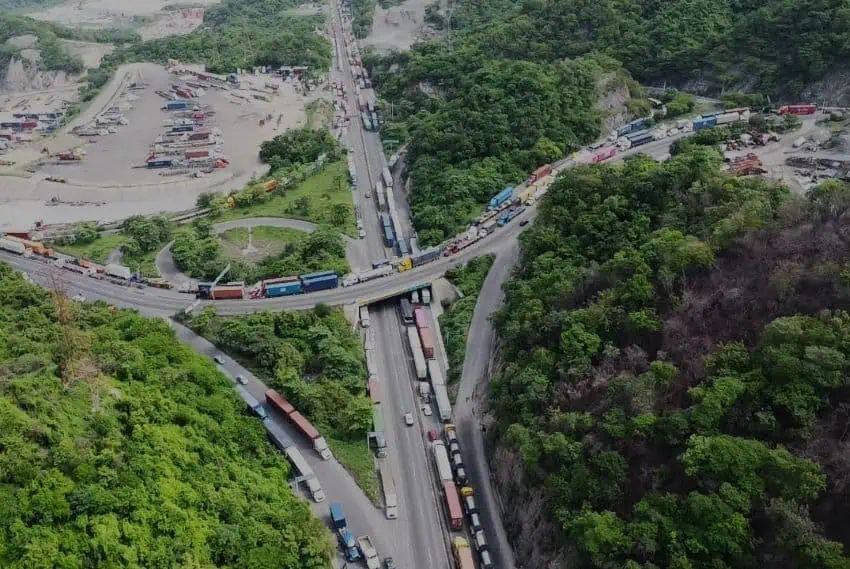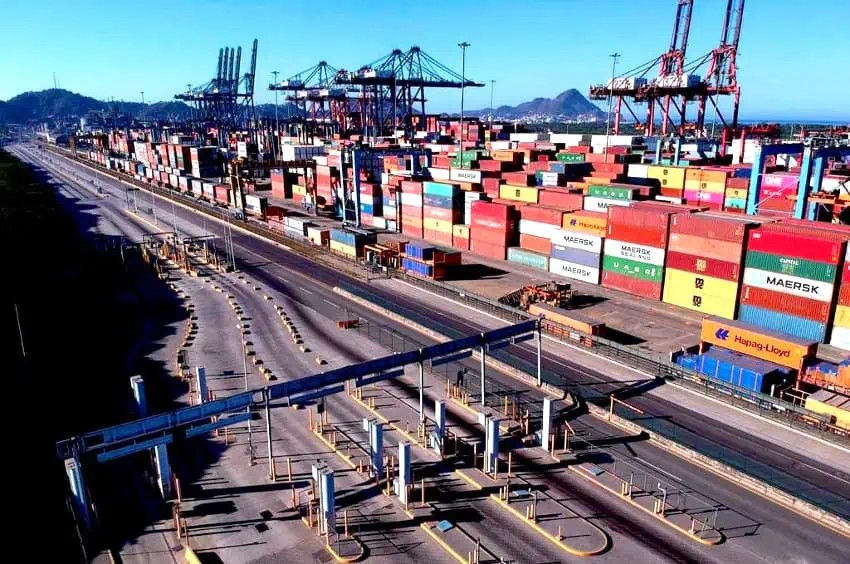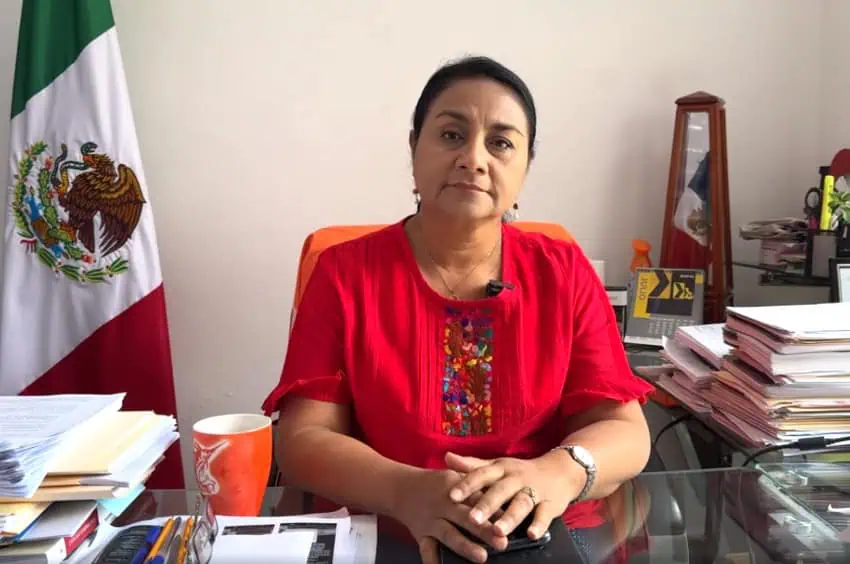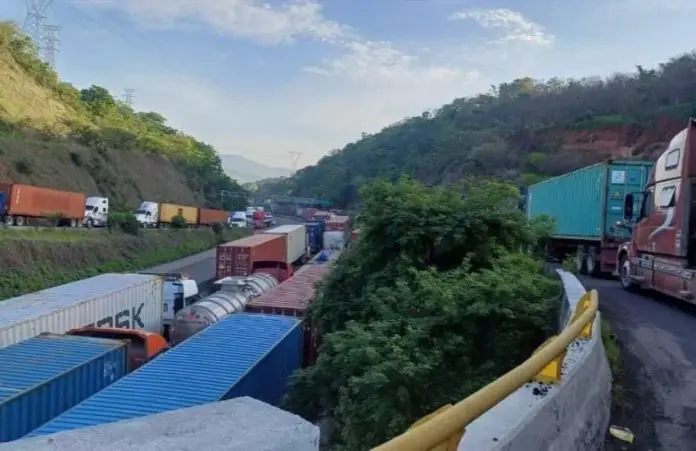Some 5,000 tractor-trailers and other vehicles were stranded for as long as 24 hours between Wednesday and Thursday due to congestion on highways leading to the port in Manzanillo, Colima.
One tractor-trailer driver reportedly died of a heart attack while stuck in traffic, while the occupants of many other vehicles endured hunger and thirst during the lengthy delay.

Federal Security Minister Rosa Icela Rodríguez told a security cabinet meeting on Friday morning that “failures in the customs system” at the port in Manzanillo caused traffic to come to a standstill.
She said that more than 5,000 freight trucks faced lengthy delays. Entrances to the port area were opened at 7 p.m. on Thursday, Rodríguez said.
The newspaper Reforma reported that Mexico’s National Customs Agency was forced to close the port to tractor-trailers at 5 p.m. on Wednesday due to failures in its system after a storm in Manzanillo on Tuesday caused power outages.
However, the Manzanillo Port Community (Copoma), which represents the companies that use Mexico’s largest port, said in a statement on Thursday that all Customs systems as well as other information systems in the port were working correctly and had not experienced “any kind of failure or problem.”

The Naval Ministry (SEMAR), which manages the port, also said in a statement on Thursday that all systems were working “without any kind of problem.”
The news magazine Proceso reported that freight truck drivers and others accused port authorities of causing the traffic chaos, asserting that they were unable to access a large truck holding yard because it had been leased to private interests.
Whatever the cause of the congestion, the delays proved costly for transport companies.
Jorge Montufar, an official with the national trucking association Canacar, estimated the losses at 100 million pesos (US $5.2 million).
Cranes also reportedly out of action at Manzanillo port
In addition to reporting on failures in the customs systems at the Manzanillo port, Reforma said that some cranes used to handle containers were out of action.
Yax Tzel Nolasco, a representative of the Manzanillo Freight Truckers Union, said that a broadband internet outage at the port prevented the operation of cranes at two port terminals.
Reforma reported that the traffic jam caused by problems at the port extended around 63 kilometers from Manzanillo to Tecomán, a coastal municipality that borders the state of Michoacán. Federal Highway 200 runs between the two cities. Reforma also said that a few secondary highways in Colima were clogged with traffic.
#BreveEnContexto | Debido a fallas en el sistema por el clima, todos los acceso al puerto de Manzanillo desde la autopista se encuentran colapsados y saturados desde hace 12 horas. Se recomienda a las personas tomar acceso alternos a esta ciudad. pic.twitter.com/24Ty5lO58T
— Contexto Colima (@ContextoColima) August 1, 2024
Videos were posted to social media showing the extent of the congestion.
In addition to trucks, cars and buses, some of which were transporting tourists to Manzanillo, also faced lengthy delays.
Miguel Ángel Landeros, president of the western Mexico branch of the Mexican Business Council for Foreign Trade, said that it is currently “high season” and as a result, 20-25% more containers are arriving at the Manzanillo port, placing additional pressure on customs and port authorities.
“They didn’t anticipate that a situation like this could occur. … The appointments given by the [port] terminals couldn’t be attended to and trucks began to accumulate,” he said.
Truckers: Inability to access holding yard caused highway ‘collapse’
Proceso said it received a document from truckers, freight brokers and logistics operators in which they accused the National Port System Administration (Asipona) of causing the traffic jam in Colima. They claimed that Asipona leased to private interests a 170-hectare holding yard, where trucks were previously directed to park before entering the port.
Stranded truckers told the newspaper El Universal that it was the “worst highway congestion” they had ever experienced.
Manzanillo Mayor Griselda Martínez attributed blame to various agencies, including Asipona.

In a video message on social media, she said that “this emergency situation was caused by the lack of capacity of terminals inside the port, the lack of attention from customs, the lack of logistics on the part of Asipona and the lack of capacity of the National Guard to operate highways.”
The mayor said she would file a complaint with the Colima Human Rights Commission “against those who repeatedly cause these highway collapses.”
The problem is the highway, not the port, says SEMAR
A statement issued by the navy, which also bears the Asipona logo, said that entrances to the port precinct were “free” and terminals inside the port were “empty.”
The navy called on operators of “external” holding yards to “speed up” the entry of freight trucks in order to clear the highway more quickly.
“The highway collapse is … outside the port,” the navy said before calling on municipal authorities to “take coordinated actions with the National Guard” and Asipona “that contribute to the clearing of highways.”
The Manzanillo Port Community also said that “the main problem” is on highways outside the port. Copoma also said that the entrances to the port were clear and terminals were empty.
Heart attack victim unable to reach hospital due to traffic chaos
Various media reports said that a truck driver suffered a heart attack at the wheel of his vehicle and died before he received medical attention. The traffic prevented the rapid transfer of the driver to the hospital. Some reports said the victim was “foreign,” but no further details were given.
Security Minister Rodríguez acknowledged the reports of the driver’s death at the Friday morning security cabinet meeting.
Many other people stranded on the highway endured long periods without food or water.
Manzanillo authorities eventually dispatched Civil Protection personnel to hand out food and beverages to truckers and other motorists. Some motorists took to social media to request food and water, and at least one person called on Manzanillo residents to go out to the highway — on motorbikes, perhaps — to sell food and drinks.
“You will sell whatever you take, they’re hungry and thirsty, including my brother,” the person wrote on social media.
With reports from Reforma, Proceso and Aristegui Noticias

Echando la culpa dondequiera.
A finger pointing exercise revealing multiple vulnerabilities. as one example,I suspect there was once a time when cranes could function with a manual recording of activity rather than coming to a standstill when the net was down. We have unwittingly become slaves to technology.
Sad to hear about the fatality.
What does it say about transparency when the press can’t find out the cause of this traffic jam. With everyone pointing the finger at someone else, how can there be any assurance that it won’t happen again.. Potential foreign investors are taking note.
I have been to Manzanillo, few years ago, and my heart goes out to those who suffered in outrageous conditions for so so long..particularly the truck driver who died of course. My heart goes out to his family in condolences. In the groundbreaking book, Mexico: “Inside the Volacano”,by Alan Riding ((I.B.Tauris, 1985,1987) the presence of corruption in every facet of life is detailed. For example, as Riding writes, (with respect to corruption and a free press) “In moments of crisis, the government can stop publication of any story with one telephone call. ….while the government does not want a hostile press, it also recognizes the need to maintain the escape valve of a seemingly free press. It therefore sees corruption simply as a way of tying the press to the system.” Pg. 131) While this was years ago, recent evidence suggests things have not changed much, if at all. AMLO was a very successful Present, if success is determined by popularity among Mexicans, (67% appx in polls recently), and he fostered that by speaking about all he was doing for the poor. The truth? ..mixed at best. So if thousands of truckers have to wait 24 hours to get through customs, well, that is the price of doing business in Mexico.